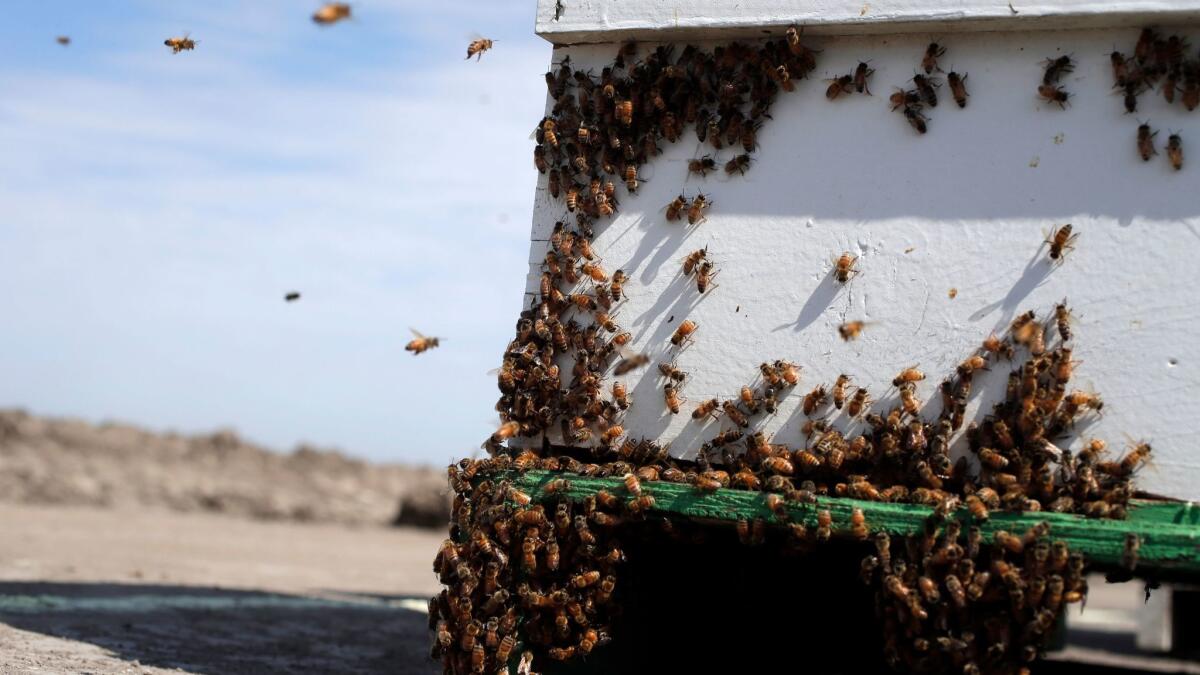Thieves steal hundreds of beehives primed to pollinate Central Valley almonds

Montana beekeeper Lloyd Cunniff shipped his 488 hives of bees in fresh, new pallets to Northern California in late December, hoping to pollinate acres of almond trees in the Central Valley.
But the bees never got to pollinate because thieves got to them first.
“Somebody stole some good colonies of bees,” the 56-year-old said Friday as he drove back home to Choteau, Mont., without his hives.
The third-generation beekeeper discovered the massive heist on Tuesday, a day after he had been tending to the bees.
Cunniff, who owns the Beeline Honey Co., had spent Monday making sure the pallets were lined straight and properly placed on a rural property near Meridian, a small community in Sutter County. Later that evening, he headed back to his hotel in Yuba City, about 16 miles east, and called it a night.
The next morning, Cunniff returned to the remote property and found it vacant. His hives had been stolen.
Someone with a lot of manpower and assistance used a 2-ton, flat-bed truck to haul away the hives, he said. They likely made two trips and used a forklift to move the hives, which were on 122 pallets, Cunniff said.
“This isn’t some fly-by-night guy who decided to steal some bees,” he said.
Lt. Dan Buttler, who oversees patrol operations in the Sutter County Sheriff’s Office, said thieves not only got to Cunniff’s hives, they also stole more than 50 pallets of beehives from another property that same night. Detectives, he said, are following up on leads.
Buttler said the theft of bees is a sophisticated operation, and hives are usually hard to track. Authorities have to work quickly to find the thieves, he said.
After stealing the hives, thieves usually swap out pallets and wipe away any identifying marks, including registration numbers, the lieutenant said. Cunniff’s bees weren’t registered in California, but were listed in Montana.
“They have to know what they are doing,” Buttler said.
Last year, the California State Beekeepers Assn. issued an advisory to beekeepers across the state after members noticed an “unprecedented” rise in beehive thefts.
The thefts were largely due to “rapidly rising prices of almond pollination,” the association said in a statement issued to beekeepers in February. More than 500 hives were stolen from the organization’s members last year.
“Hive theft is not a problem that will go away,” the association said. “Beekeepers, bee brokers, and almond growers need to be vigilant and work together to prevent hive theft and catch those responsible.”
Cunniff said he doesn’t plan to return to California in the future.
Before thieves stole his bees, he had planned to eventually truck the hives to almond tree fields in Fresno, he said. Cunniff said he was hoping to make some money after last year’s honey crop came up short.
But the theft wiped him out. Cunniff has only one colony of bees remaining. He estimates he lost hundreds of thousands of dollars in hives and equipment.
“I am going to start over from scratch now,” he said.
For breaking news in California, follow @VeronicaRochaLA on Twitter.
More to Read
Start your day right
Sign up for Essential California for news, features and recommendations from the L.A. Times and beyond in your inbox six days a week.
You may occasionally receive promotional content from the Los Angeles Times.






